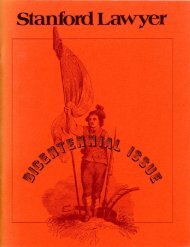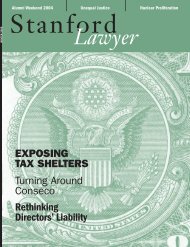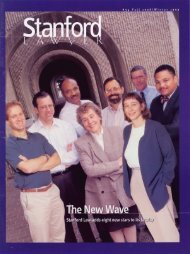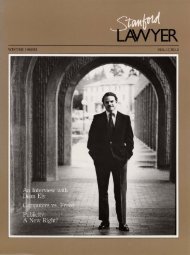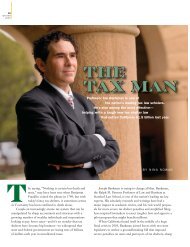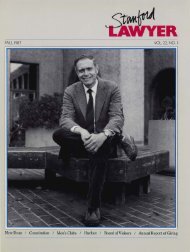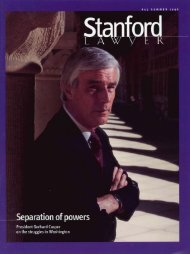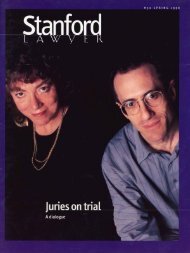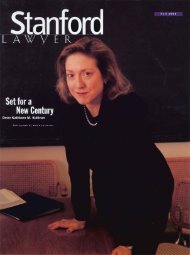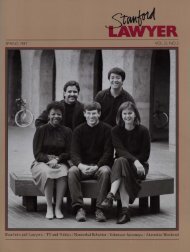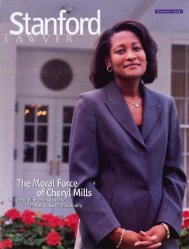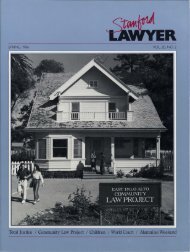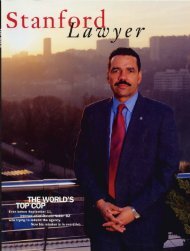@otwrA 4vJ41~ .SUMMARY AND ADVISORY SESSIONG. Williams Rutherford '50 and Alan Rosenberg, AB '49r. Duryea, speaking as chairM of the Board of Visitors, expressedthe members' appreciationand enjoyment of the proceedingsand interactions that had taken placethroughout the meeting.Dean Ely then commented onsome concerns raised in conversationswith various members.Admissions decisions, he explained,"are not made by computer-they're made on a very personalbasis." The folders of each applicantare reviewed carefully, andwe consider not only LSAT scoresand grade-point averages, but alsowritten recommendations and informationon past academic work experiences,interests and activities,and other relevant characteristics."We're a small law school," Dean Elynoted, "and we're able to make thedecisions more carefully."The Dean also acknowledged thevery strong message, expressedmany times throughout the meeting,that law schools should "give moreattention to alternative methods ofdispute settlement- methods otherthan litigation."The course by Professor Mnookinand Ms. Moulton mentioned earlierin the program speaks directly tothat concern, the Dean observed.Aptly titled Alternative Methodsof Dispute Settlement, it examinesnegotiation, mediation, arbitration,and adjudication, with readings fromeconomics, social psychology, decisiontheory, and legal theory.The <strong>Lawyer</strong>ing Process course forfirst-year students, Dean Ely continued,is also "centrally designed tosocialize students to the idea thatmany or most legal disputes can,and probably should, be settled bytalking about them and negotiatingrather than actually taking them tocourt."As these examples indicate, DeanEly said, the School is well aware ofthe need for education in alternativemethods of dispute settlement, buthe agreed with the Visitors that furtherprogress in that direction wouldbe eminently desirable-not only forthe School but also for the professionas a whole.Dean Ely then asked for questionsand comments from the members ofthe Board of Visitors.One member mentioned that studentsin the small lunch group inwhich she participated had expressedthe feeling that perhaps theSchool "doesn't make it easy enoughto get into public interest law."Dean Ely responded that theSchool is, in fact, doing a great dealto ensure that students are informedof their many career options, asdetailed in his memo to studentsissued January 25 [see pp. 53-55], andin meetings sponsored by the PlacementOffice and by the faculty. Thiseffort will continue, he said, butultimately, the choice is and mustbe the responsibility of the studentsthemselves.The possibility of starting apooled, revolving student-aid loanfund was suggested by anothermember of the Board. Deans Diazand McBride responded that theywould pursue the idea, to seewhether it was administrativelypracticable.In closing, Dean Ely thankedBoard Chair Les Duryea for his fineservice during the 1982/83 term andparticularly for his initiative in organizingthe stimulating panelon Successful <strong>Lawyer</strong>ing-a "uniquecontribution" to this year's Board ofVisitors meeting agenda. _44<strong>Stanford</strong> <strong>Lawyer</strong> <strong>Fall</strong> <strong>1983</strong>
BOARD OF VISITORS: 1982-83Terms ExpireAugust 31,<strong>1983</strong>Howard P. Allen '51Rosemead, CaliforniaFred W. Alvarez '75Albuquerque, New MexicoLeroy Bobbitt '69Los Angeles, CaliforniaJackie R. Brown '75Seattle, WashingtonPhillip E. Brown '52San Francisco, CaliforniaJose Alberto Cardenas '77Phoenix, ArizonaEverett B. Clary'49Los Angeles, CaliforniaEdwin H. Clock '75Tiburon, CaliforniaMary B. Cranston '75San Francisco, CaliforniaHon. Betty Binns Fletcher,AB '43 (<strong>University</strong> ofWashington, LLB '56)Seattle, WashingtonSamuel K. Freshman '56Los Angeles, California*Del Fuller, Jr. '55San Francisco, CaliforniaDiane Fields Geocaris '75Chicago, IllinoisGeorge M. Henzie '49Los Angeles, CaliforniaMorgan Hodgson '73Washington, D.C.Joseph G. Hurley(Catholic <strong>University</strong> ofAmerica, JD '50)North Hollywood, CaliforniaNelson M. Ishiyama,JD/MBA'72San Francisco, CaliforniaC. Bradford Jeffries '55San Francisco, CaliforniaDonald P. Kennedy, AB '40(USC, LLB '48)Santa Ana, CaliforniaWilliam T. Lake '68Washington, D.C.R. Allan Leedy, Jr. '67Beaverton, OregonLouis Lieber, Jr., AB '<strong>30</strong>(USC, JD '36, LLM '54)Los Angeles, CaliforniaRichard B. McDonough'49San Francisco, California*Jerome C. Muys '57Washington, D.C.George H. Norton '57Palo Alto, California*Donald V. Petroni '58Los Angeles, California*Norman B. Richards '51San Francisco, CaliforniaKenneth Roberts(<strong>University</strong> of Texas, JD '51)Houston, TexasPaul L. Saffo III '80Palo Alto, CaliforniaRoy J. Schmidt, Jr. '66Los Angeles, CaliforniaJoel H. Sharp, Jr. '60Orlando, FloridaHon. Winifred Johnson Sharp'61Daytona Beach, FloridaHugh Shearer III '51Honolulu, HawaiiC. Grant Spaeth, AB '54(Harvard, )JD '57)Palo Alto, CaliforniaLeonard Ware(Syracuse <strong>University</strong>, LLD '53)Palo Alto, CaliforniaCharles R. Wichman '52Honolulu, HawaiiFred A. Wool '29San Jose, CaliforniaTerms ExpireAugust 31, 1984Robert F. Ames '60(<strong>Stanford</strong>, MBA '57)San Diego, CaliforniaJames E. S. Baker(Northwestern, LLB '36)Chicago, IllinoisAlan Beban '63Los Altos, CaliforniaSusan W. Bird '74New York, New YorkJohn Broad'42San Francisco, CaliforniaCharles R. Bruton '71Philadelphia, PennsylvaniaGeorge W. Coombe, Jr.(Harvard, LLB '49)San Francisco, CaliforniaEllen B. Corenswet '75Boston, MassachusettsJ. Nicholas Counter III '66Sherman Oaks, CaliforniaHon. John J. Crown, AB '51(Northwestern, LLB '55)Chicago, Illinoisl*L. N. Duryea '50Newport Beach, California*Member ofExecutive Cmnmittee1 *Chainnan, Executive Cmnmittee2 *Vice Chainnan, Executive Cmnmittee<strong>Fall</strong> <strong>1983</strong> <strong>Stanford</strong> <strong>Lawyer</strong>45
- Page 1 and 2: RFAll 1983VOL. 18, NO.1Heroin Optio
- Page 3 and 4: jah(e,oYCONTENTSSTANFORD lAWYEREdit
- Page 5 and 6: Business Law vs. Public Interest La
- Page 7 and 8: By John Kaplanjockson Eli ReynoldsP
- Page 9 and 10: maintenance almost entirely up toth
- Page 11: smaller percentage of British addic
- Page 14 and 15: that, because of regulation, cannot
- Page 16 and 17: of a whole variety of new mortgagei
- Page 18 and 19: ConversationsWith Five AlumniBy Mic
- Page 20 and 21: y landlords and tenants about rents
- Page 22 and 23: when I was studying law and she was
- Page 24 and 25: ~o(1)AtISSUE *Union 'Rights' in the
- Page 26 and 27: AtISSUECongressional Responses toSu
- Page 28 and 29: AtISSUEPrison Labor:TimeTo Take Ano
- Page 30 and 31: Graduates and friends of theSchool
- Page 32 and 33: ~o~ 4'-VVcYi~STATE OF THE SCHOOLJoh
- Page 34 and 35: ~o~ Cff-VIMtu'0r-STATE OF THE SCHOO
- Page 36 and 37: ~o~ 4-(/141~STATE OF THE SCHOOL con
- Page 38 and 39: ~o~4VJ41~SUCCESSFUL LAWYERING:IMPLI
- Page 40 and 41: ~o~of-VJM~SUCCESSFUL LAWYERING cont
- Page 42 and 43: @.oarcA 4l!141~THE CONSTITUTION, RA
- Page 44 and 45: @o~4t1J41~.LAW AND BUSINESS PROGRAM
- Page 48 and 49: David L. Engel(Harvard, JD '73)Bost
- Page 50 and 51: New Faculty (cont.)Michigan Law Sch
- Page 52 and 53: GILSON (cant.)Gilson is currently p
- Page 54 and 55: BabcockAwarded anHonorary LL.D.by S
- Page 56 and 57: CAREER 'ALTERNATIVES' (cant.)2. A s
- Page 58 and 59: Hurlbut WinnerTalks AboutTeachingPr
- Page 60 and 61: Schod;NI Grads Scatter toCities All
- Page 62 and 63: FACULTV NOTES (cant.) Professor Gun
- Page 64 and 65: it will be less so if we adopt a he
- Page 66 and 67: than on its edges, thus increasing
- Page 68 and 69: Heroin maintenance is, in manyways,
- Page 70 and 71: c~OTESII1912-25Hon. David Lee Rosen
- Page 72 and 73: c~NOTESthe firm advises, that "Donn
- Page 74 and 75: c~NOTESand had been prominent in a
- Page 76 and 77: spring Dean Ely traveledLEast, wher
- Page 78 and 79: 5Stanford LaWlers:This Page IsYours
- Page 80 and 81: October 11Washington, DC LawSociety
- Page 82 and 83: COMPARATIVE CONTRIBUTIONS TOTHE LAW
- Page 84 and 85: A MESSAGE FROM THELAW FUND PRESIDEN
- Page 86 and 87: CLASSAGENTSLong BeachSterling S. Cl
- Page 88 and 89: Warren Christopher'49 Penny Howe Ga
- Page 90 and 91: Frank L. Mallory '47Richard C. Mall
- Page 92 and 93: Ronald G. Trayner '67Anthony J. Tre
- Page 94 and 95: Walter A. Johnson, A.B. '29 Maxine
- Page 96 and 97:
DONORS TO THE LAW FUND• Hon. Murr
- Page 98 and 99:
CLASS OF 1948R. Winfield AchorHon.
- Page 100 and 101:
• Thomas R. MitchellR. Chandler M
- Page 102 and 103:
Paul E. Kreutz• Prof. Richard B.
- Page 104 and 105:
Gabriel M. GesmerMichael GilfixCorn
- Page 106 and 107:
HIGHEST LEVELSOF PARTICIPATIONLARGE
- Page 108 and 109:
FACULTY, FORMERFACULTY &STAFFBarbar
- Page 110 and 111:
REUNION GIVINGWhile class reunions
- Page 112 and 113:
DONORS TO SPECIALPROGRAMS AND FUNDS
- Page 114 and 115:
Class of 1954 Reunion Student Finan
- Page 116 and 117:
In Memory of:Clifton C. Cottrell '2
- Page 118 and 119:
Clyde E. Tritt'49William W. VaughnS
- Page 120:
BEQUESTS AND DEFERRED GIVINGBequest




